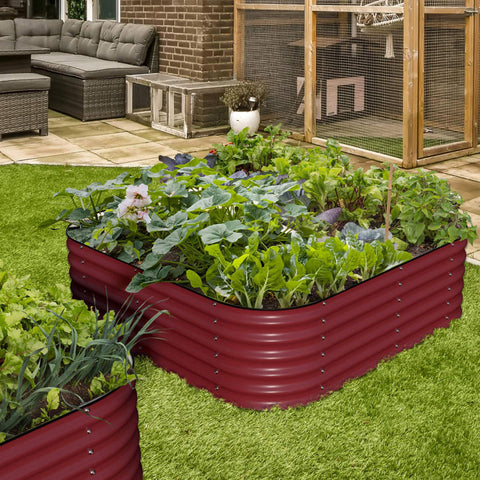7 Plants Planted for Insect Prevention Garden Beds
When pests come to the yard, the result is often frustration for the gardener. Aphids, beetles, whiteflies, squirrels, deer, the list of disturbances is still ongoing! So, what can you do to protect your garden against these pests? Fortunately, one answer to staying away from small garden animals is to plant more plants in the garden bed! There are specific plants that can drive away, prevent, and prevent pests from occupying your yard. But which plant works best? Are they friendly companion plants for other garden residents?
Don't worry about the pests you encounter anymore. Plant these plants in your garden bed to work towards an insect resistant yard! Soon you will say, 'goodbye, worm'!

Geranium
Geranium is a perennial plant that comes in white, pink, red, and purple. They not only add attraction to your garden, but also protect the surrounding plants!
Geranium is an excellent companion plant for roses, tomatoes, and cabbage. When japanese beetles eat geranium petals, they can paralyze them for up to 24 hours. In a paralyzed state, the gardener either has the opportunity to remove them or predators will eat them. As is well known, geraniums repel cabbage worms due to their strong odor!
Let nature do what it is best at, plant geraniums to deal with these pests for you!
Coriander
When it comes to good companion plants in a vegetable garden, planting coriander is a good choice. This annual herbaceous plant helps to repel insects and is an important supplement in the kitchen.
When planted in the garden next to spinach and potatoes, it was found that coriander can protect plants from pests. Specifically, it can stay away from aphids, spider mites, and potato beetles.
Harvest coriander leaves in summer until early autumn. Gardeners can also harvest coriander seeds at the end of the spring growing season when the plants bloom.
Allium genus
To prevent pests like aphids from entering your yard, scallions are a great starting point. Scallions, chives, and garlic are just a few plants in this genus that can prevent troublesome garden pests.
By using the strong odor they emit, pests such as aphids, japanese beetles, and carrot flies often stay away. Do you need another reason to plant onion plants? Many of these plants are amazing pollinators, attracting beneficial insects such as bees and butterflies to your garden!
Marigold
When asked about the plants used to create insect resistant gardens, many gardeners swear to marigold. It is said that these bright yellow and orange flowers can protect your plants from insects and wildlife.
It is said that marigold drives away deer and rabbits. According to a 2019 study on digital object identifiers, they can also protect tomatoes from harmful insects such as whiteflies, thanks to their strong aroma. Some people even found that marigold can also repel aphids and flea beetles. However, although many people believe that marigold is the answer to staying away from pests, there are still some doubts. There is not much scientific evidence to clearly prove the insect resistance of marigold.
Do you have space and interest to plant beautiful and potentially useful flowers? If that's the case, there's no harm in trying marigolds!
Dill
Although many plants can repel pests, dill helps your garden in different ways. The reason why dill is a good herbaceous plant is because it attracts insects.
Dill is a herbaceous plant that grows about 3 feet tall and provides a wonderful scent for your yard and kitchen. It is a wonderful pollination medium that can attract insects such as butterflies and bees, which is beneficial for your other plants. Dill is also famous for painting ladybugs! Why is this important? Ladybugs help to get rid of aphids, asparagus beetle larvae, whiteflies, etc.
Want to draw good bugs and get rid of bad ones? Dill is the answer!
Mint
It smells very fragrant, and herbs used for tea, cocktails, and cooking are also good herbs for repelling pests! The strong mint flavor is also something that keeps bad insects away.
When mint is planted in the garden, it can repel various harmful insects, such as cabbage moths, aphids, and ants. Do you want to further eliminate pests? The oil harvested from mint plants can be used as an environmentally friendly herbicide and can drive away wild animals when used in gardens.
Please remember that when planting mint, it will quickly spread and grow. If not properly controlled, mint is invasive and occupies the garden. One way to prevent this situation is to keep the mint in a container so that it does not extend to your other plants.
Borage
Another natural herb used for insect prevention gardens is the annual borage!

In summer, this simple and beautiful plant produces exquisite blue flowers that attract pollinators such as bees. Borage has also been found to repel pests such as hornworms and cabbage worms. Flowers attract beneficial insects such as predatory wasps and aphid flies, which consume troublesome pests in the garden. Borage is an excellent companion plant for tomatoes, strawberries, and pumpkins, which are more susceptible to these specific pests.
But the benefits of borage are not limited to this! This herb can also add trace minerals to the soil, enhancing the trace minerals of nearby plants. When a plant finishes its life, many gardeners also use the remains of the deceased as a cover!
Start pest control on your garden bed!
Are you ready to protect the flowers, vegetables, and fruits in the garden? With the addition of these natural plant companions, you will make your garden happier and healthier! Use these seven plants to prevent insects in your garden and enjoy a season without worries!
